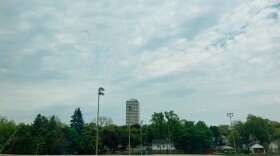For more than two decades, Milwaukee’s Wisconsin Lutheran High School has held a service to honor veterans on Veterans Day. The service typically introduces students to someone who has served in some capacity in the armed forces, and this year’s honored speaker has a unique story to tell.
Lieutenant Colonel Henry Ratenski served in what was then the Army Air Force at the end of World War II...the very end.
The 91-year-old Ratenski, who lives in Brookfield, flew in the last mission of World War II in the 315th Bombing Wing, completing it after the Japanese surrender.
"We were used as pioneers to see whether precision radar bombing by radar is possible," Ratenski explains. Ratenski and the other members of the crew operating a B-29B "Superfortress" would fly up to 18 hours bombing Japan at night, guided by radar. The goal of the B-29 program was to bomb Japan in a 24-hour cycle to hasten a surrender. But Japan's surrender didn't quite go the way Ratenski and his crew were preparing for.
Ratenski and the crew flew 15 missions, destroying oil refineries with 98.3% accuracy. Had the war continued, he said B-29B bombers would have carried out missions to target bridges and nitrogen plants to cripple Japan.
The last and longest mission took off from Guam was scheduled to leave an hour earlier than normal. But when Ratenski's crew was told to stop the engine, they suspected the war had ended. However, a short time later, the mission was on again, and the crew flew nonstop for 18 hours, covering 3800 miles each way.
"The international press is already talking about the Japanese surrender," Ratenski recalled. So everybody was already celebrating – a lot of the air crew guys – they were probably not fit to make that last mission. Because they were already celebrating, see?" he said.
Briefed only a few hours before take off, Ratenski used the 6-8 hours of travel time to Japan to prepare and know exactly what the target looked like.
"People ask me the question, 'were you ever scared or afraid?' I said, 'Yes I was. I was afraid I had missed that target, and that's about the only fear I had," says Ratenski. "Can you imagine going up there with ten guys, a B-29, coming back, and then the intelligence people saying 'you missed the target!'"
Ratenski and his crew found out mid flight that the war was officially over, but they remained focused. With the mission completed, Ratenski and the crew's war ended after the whole world started celebrating.
"We were at 12000 feet over Iwo Jima, 800 more miles to go....so my war was four hours longer than your war," he says.
Wisconsin Lutheran High School has been hosting its annual Veterans Day Observance for 21 years, bringing in veterans from all over the country to share their stories with high school students.
Teacher Roger Festering coordinates the events, and explains that the school is "trying to make these stories alive...the books weren't there and this is the real deal."
Matt Bilitz, mission advancement director at WLHS, says the event not only gives students a different perspective to history, but is "really about the respect that we have for one another and the respect that we have for those that have gone before us."
To attend WLHS' Veterans Day Observance and hear Henry Ratenski, Lt. Col. USAF Retired speak, contact the school or visit their website. A livestream of the event will be available at 8:30am on Wednesday November 11th.









